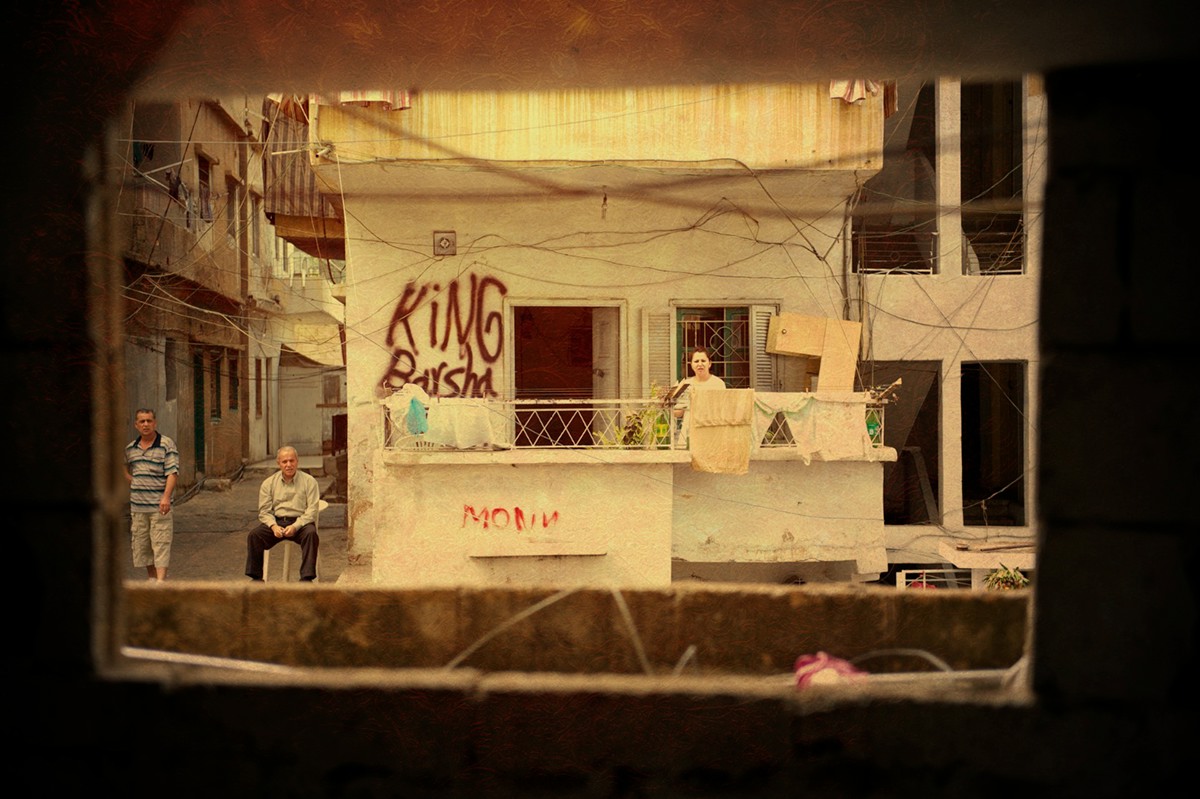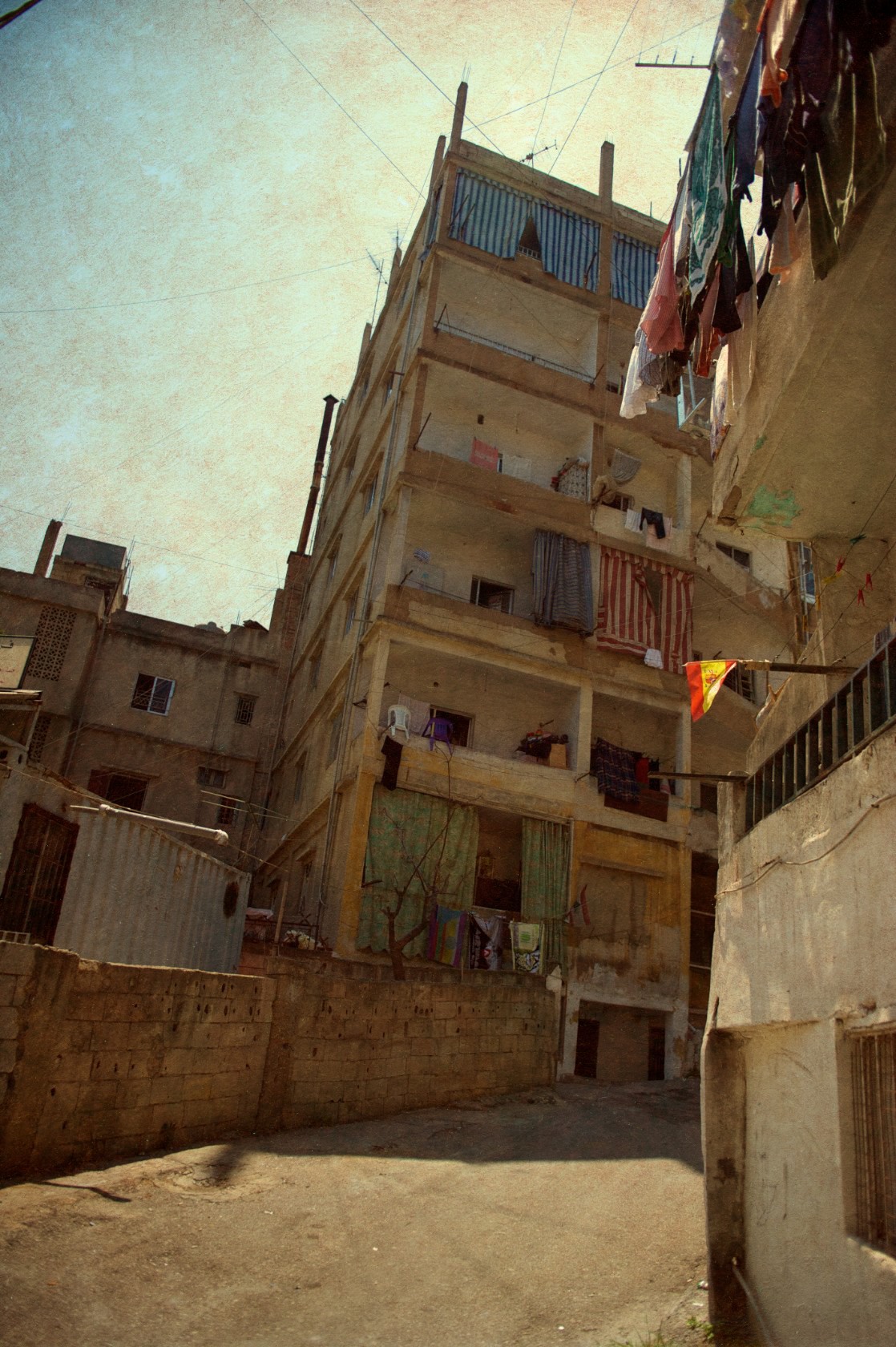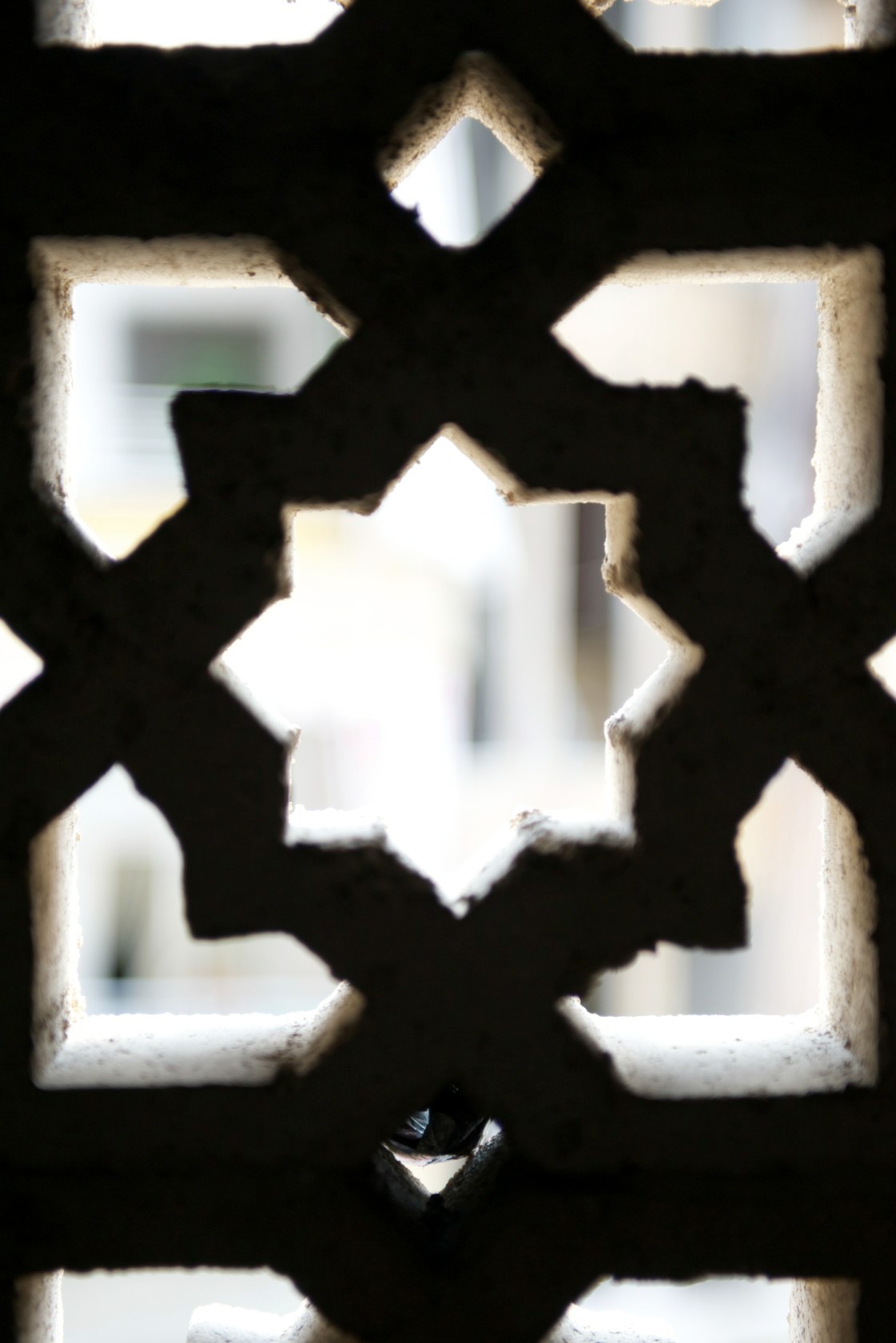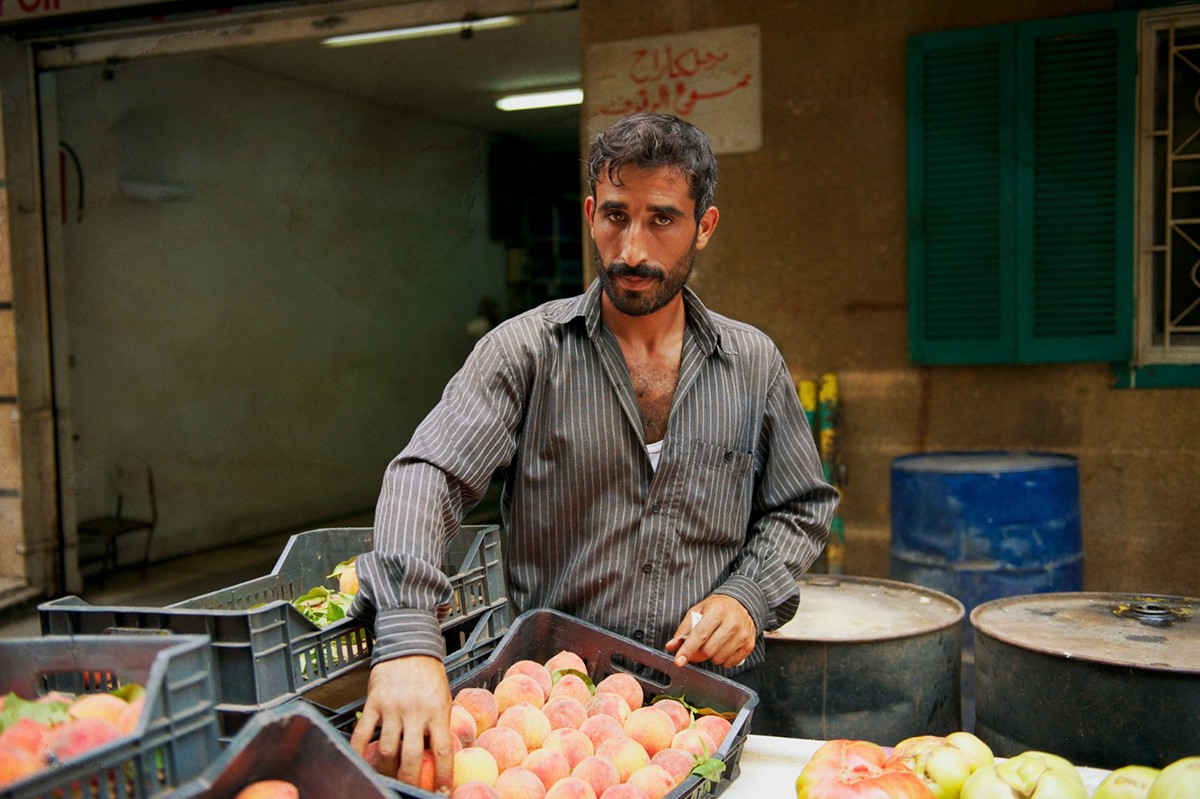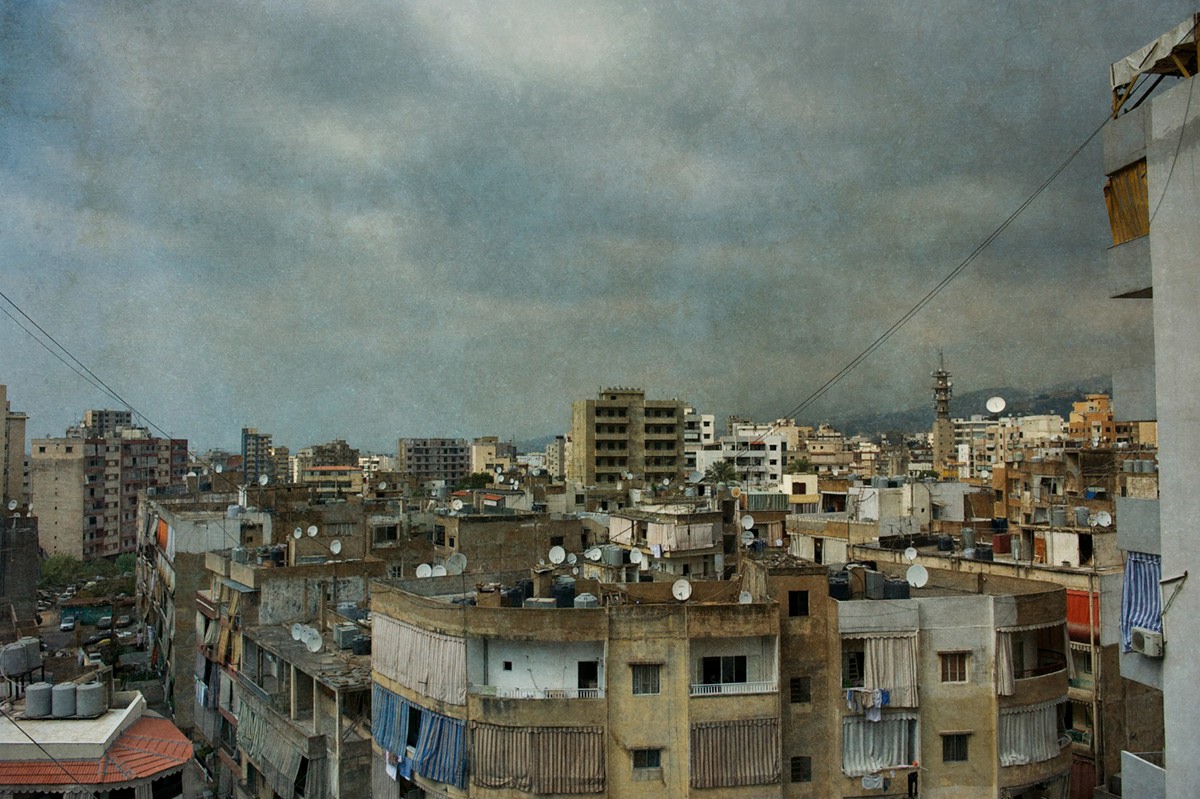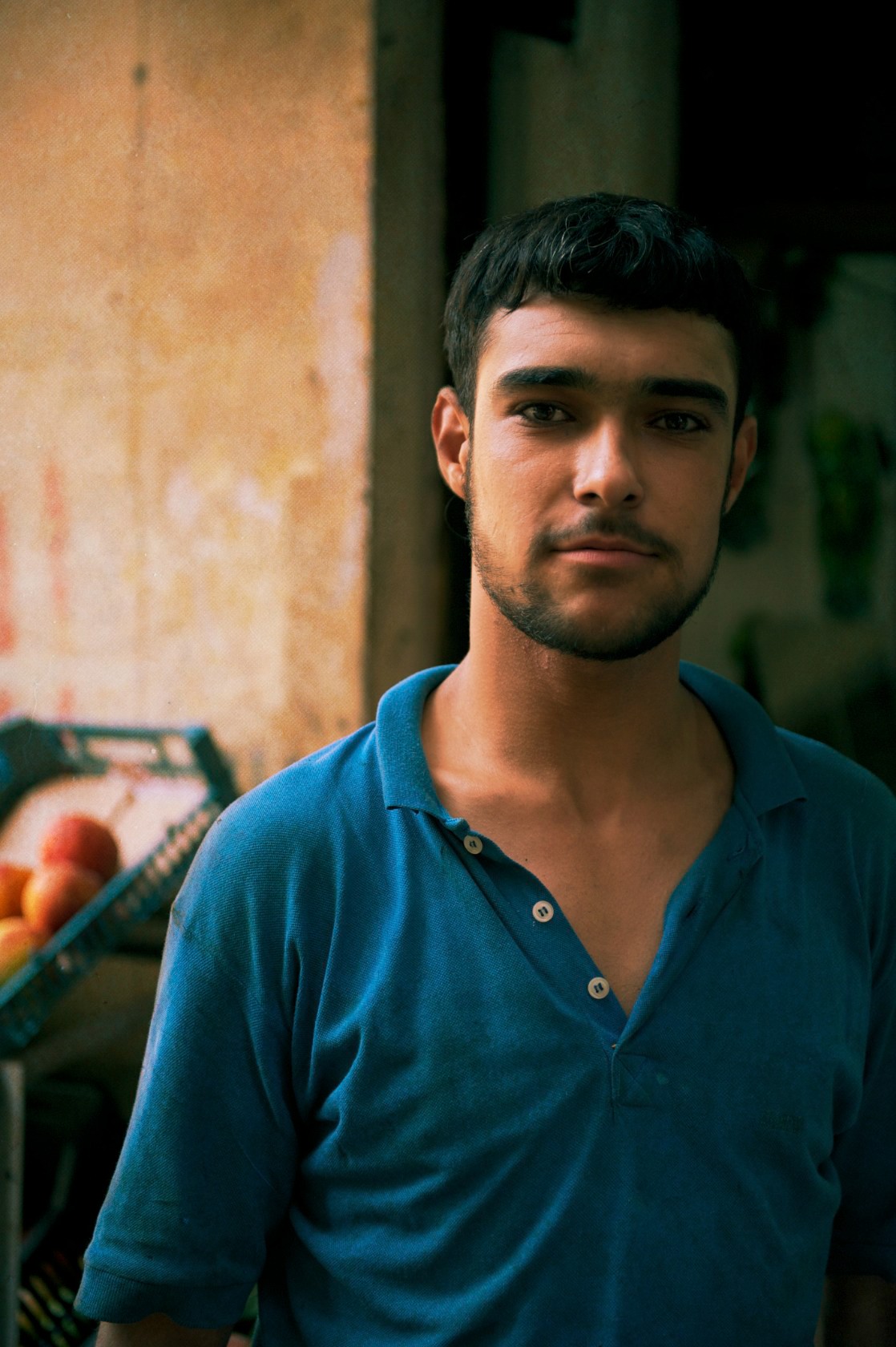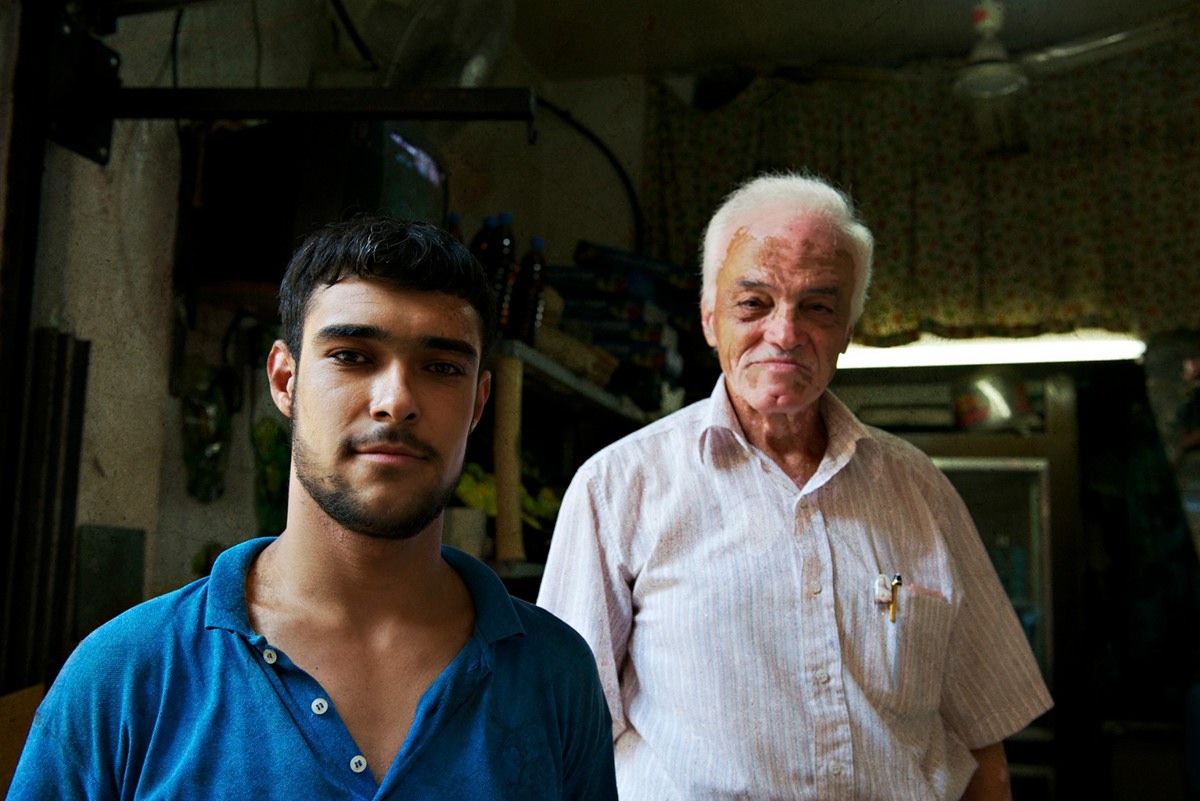Beirut - Summer 2o1o
Photos by Joshua Seale | Stories by Nathalie Borg Seale
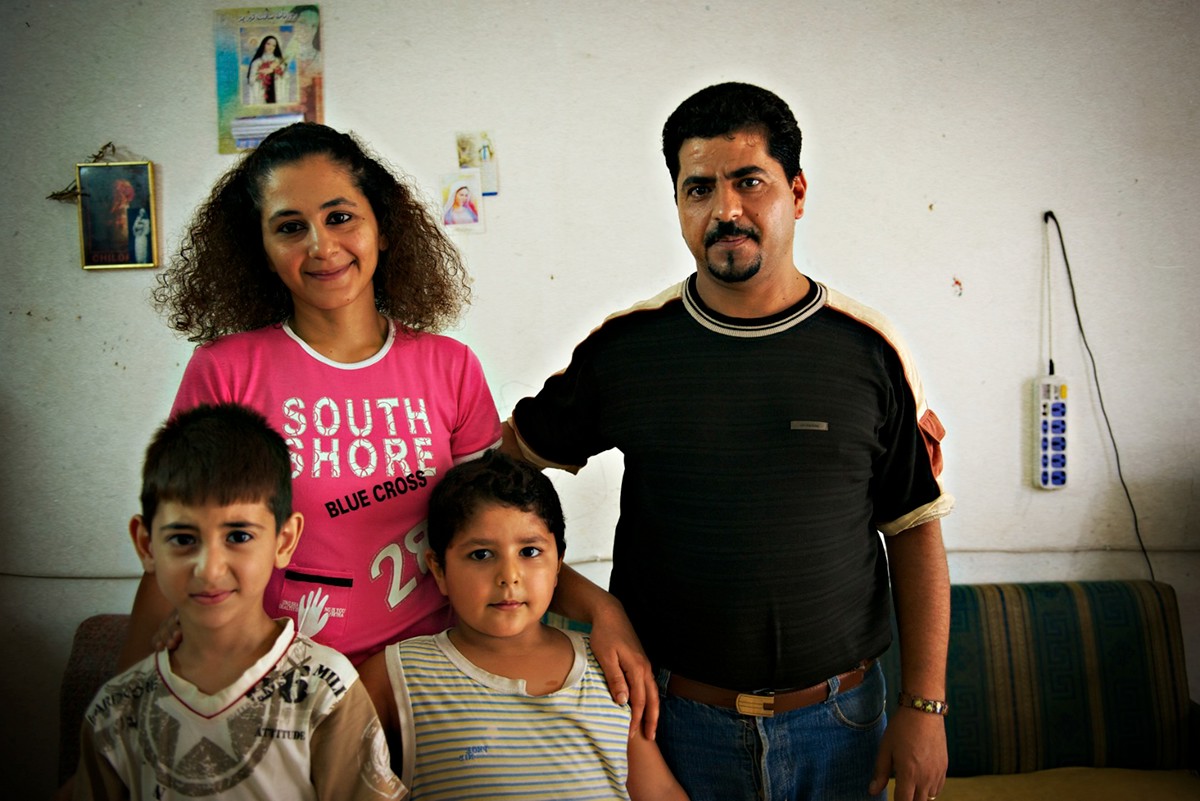
Manuel, standing between his parents, with his Iraqi friend.
Children of Iraq
I met Manuel after I had listened to his story, and it was only for a brief moment, mostly taken up by posing for the picture shown above. He had peeked into the room we were visiting in a few times, every instance giving us a quick curious look and a shy smile, and then running back into the hallway where he had been playing with one of his Iraqi friends. However, albeit brief, I savored that moment. I looked at Manuel, intently, debating whether the five-year old would receive a hug or a hair-ruffle best. I never got to attempt either, as the minute he was able to get out of his parents grip and our sight, he did so, running back into the hallway with his friend.
Manuel is like a precious gem to his parents. A gem, that was briefly lost but found again, now held dearer than ever before. At the frail age of three Manuel was kidnapped from right outside his home in Baghdad, Iraq. He was held for ten long days, during which he was awfully treated, as the bruises and the cigarette burns on his body clearly attested when he was returned. The ransom demanded for him was of $30,000 but between combining savings and borrowed money from family and friends, Manuels parents barely managed to come up with half the sum. The kidnappers agreed to return their son for half the money, as long as they agreed to leave Iraq. And so they did. Two years later, most of which were spent in Lebanon, Manuel does not leave the house unless he is accompanied by at least one of his parents. He has come a long way from using everything as a weapon, acting aggressively towards others, and continuously wanting to fight other children, but he has not quite forgotten what he went through. And how could he. Listening to his story I understood why Manuel was curious as to who we were, but not curious enough to come in and meet us, until he had to.
Sadly, Manuel was not the first Iraqi child I met who had been kidnapped and luckily released. Children are easy targets during any war, and in Iraq they are snatched from outside schools, homes, and from the streets. Some are ransomed. Others are never heard of again. Allow me to tell the story of one other child, this time a girl, Fabiolla, also five years of age. I wish I had a picture of Fabiolla to share, but since I dont you will have to take my word for it when I say that she was just beautiful. Her dark wavy hair and big brown eyes sure made for a gorgeous little face. The tiny room she shared with her parents and two young siblings was too small to provide her with a hiding place and so, although she never left her mothers side, I got to enjoy her presence. She was clearly apprehensive about our visit, coming out last to greet us and, as her mother shared, asking if we were armed with weapons when told that we were paying them a visit. When Fabiolla was kidnapped, her family was asked to either pay a ransom or leave Iraq, and because her young parents could not afford the former, they chose to leave Iraq. The nightmare is still very real for all of them, as the family had been in Lebanon for just a few months when we paid them the visit. They all want to forget, but it is easier said than done. Fabiollas father lost his father to the kidnapping, who instantly died of a heart attack when he heard the tragic news. It is difficult not to look back and dwell on the hard moments, but the parents need to be strong for their three children, and so they are being, putting on a brave face, their eyes only giving them away.
The Iraqi children I met in Lebanon are a living witness of the many faces of the war in Iraq. They come first amongst its most vulnerable victims, physically and emotionally tainted by close to a decade of hatred, endless violence, and death. It is all they have ever known. But they are also bundles of immense and infectious joy, able to live for the moment and enjoying every second of it. Their innocence allows them to forget, enough to enjoy the here and now. They are a ray of light in the dark, bringing hope to families who have lost brothers, sisters, husbands, wives, fathers, and mothers to this war and others before it. They are the passion that drives their parents to survive, to make it through, to hope for a better day. Their life will attest to heroic fathers and mothers who willingly gave up everything they had to start anew, that their children may gain what they have lost forever. Childrens laughter and playful shrieking is what resounds in the staircases of dull, old buildings, in streets deserted in the scorching heat. Their voices are a soothing balm to many broken hearts and weary souls. And, I hope that the children of Iraq will be key players in the nations future, redeeming an exodus by returning with a vision and a passion to see their nation transformed and restored into a new land that reflects who they are as a people.
I met Manuel after I had listened to his story, and it was only for a brief moment, mostly taken up by posing for the picture shown above. He had peeked into the room we were visiting in a few times, every instance giving us a quick curious look and a shy smile, and then running back into the hallway where he had been playing with one of his Iraqi friends. However, albeit brief, I savored that moment. I looked at Manuel, intently, debating whether the five-year old would receive a hug or a hair-ruffle best. I never got to attempt either, as the minute he was able to get out of his parents grip and our sight, he did so, running back into the hallway with his friend.
Manuel is like a precious gem to his parents. A gem, that was briefly lost but found again, now held dearer than ever before. At the frail age of three Manuel was kidnapped from right outside his home in Baghdad, Iraq. He was held for ten long days, during which he was awfully treated, as the bruises and the cigarette burns on his body clearly attested when he was returned. The ransom demanded for him was of $30,000 but between combining savings and borrowed money from family and friends, Manuels parents barely managed to come up with half the sum. The kidnappers agreed to return their son for half the money, as long as they agreed to leave Iraq. And so they did. Two years later, most of which were spent in Lebanon, Manuel does not leave the house unless he is accompanied by at least one of his parents. He has come a long way from using everything as a weapon, acting aggressively towards others, and continuously wanting to fight other children, but he has not quite forgotten what he went through. And how could he. Listening to his story I understood why Manuel was curious as to who we were, but not curious enough to come in and meet us, until he had to.
Sadly, Manuel was not the first Iraqi child I met who had been kidnapped and luckily released. Children are easy targets during any war, and in Iraq they are snatched from outside schools, homes, and from the streets. Some are ransomed. Others are never heard of again. Allow me to tell the story of one other child, this time a girl, Fabiolla, also five years of age. I wish I had a picture of Fabiolla to share, but since I dont you will have to take my word for it when I say that she was just beautiful. Her dark wavy hair and big brown eyes sure made for a gorgeous little face. The tiny room she shared with her parents and two young siblings was too small to provide her with a hiding place and so, although she never left her mothers side, I got to enjoy her presence. She was clearly apprehensive about our visit, coming out last to greet us and, as her mother shared, asking if we were armed with weapons when told that we were paying them a visit. When Fabiolla was kidnapped, her family was asked to either pay a ransom or leave Iraq, and because her young parents could not afford the former, they chose to leave Iraq. The nightmare is still very real for all of them, as the family had been in Lebanon for just a few months when we paid them the visit. They all want to forget, but it is easier said than done. Fabiollas father lost his father to the kidnapping, who instantly died of a heart attack when he heard the tragic news. It is difficult not to look back and dwell on the hard moments, but the parents need to be strong for their three children, and so they are being, putting on a brave face, their eyes only giving them away.
The Iraqi children I met in Lebanon are a living witness of the many faces of the war in Iraq. They come first amongst its most vulnerable victims, physically and emotionally tainted by close to a decade of hatred, endless violence, and death. It is all they have ever known. But they are also bundles of immense and infectious joy, able to live for the moment and enjoying every second of it. Their innocence allows them to forget, enough to enjoy the here and now. They are a ray of light in the dark, bringing hope to families who have lost brothers, sisters, husbands, wives, fathers, and mothers to this war and others before it. They are the passion that drives their parents to survive, to make it through, to hope for a better day. Their life will attest to heroic fathers and mothers who willingly gave up everything they had to start anew, that their children may gain what they have lost forever. Childrens laughter and playful shrieking is what resounds in the staircases of dull, old buildings, in streets deserted in the scorching heat. Their voices are a soothing balm to many broken hearts and weary souls. And, I hope that the children of Iraq will be key players in the nations future, redeeming an exodus by returning with a vision and a passion to see their nation transformed and restored into a new land that reflects who they are as a people.
The following pictures were mostly taken in the Dekwaneh neighborhood, Beirut, one of the four neighborhoods where most of the nominal Christian Iraqi refugees have temporarily settled in.
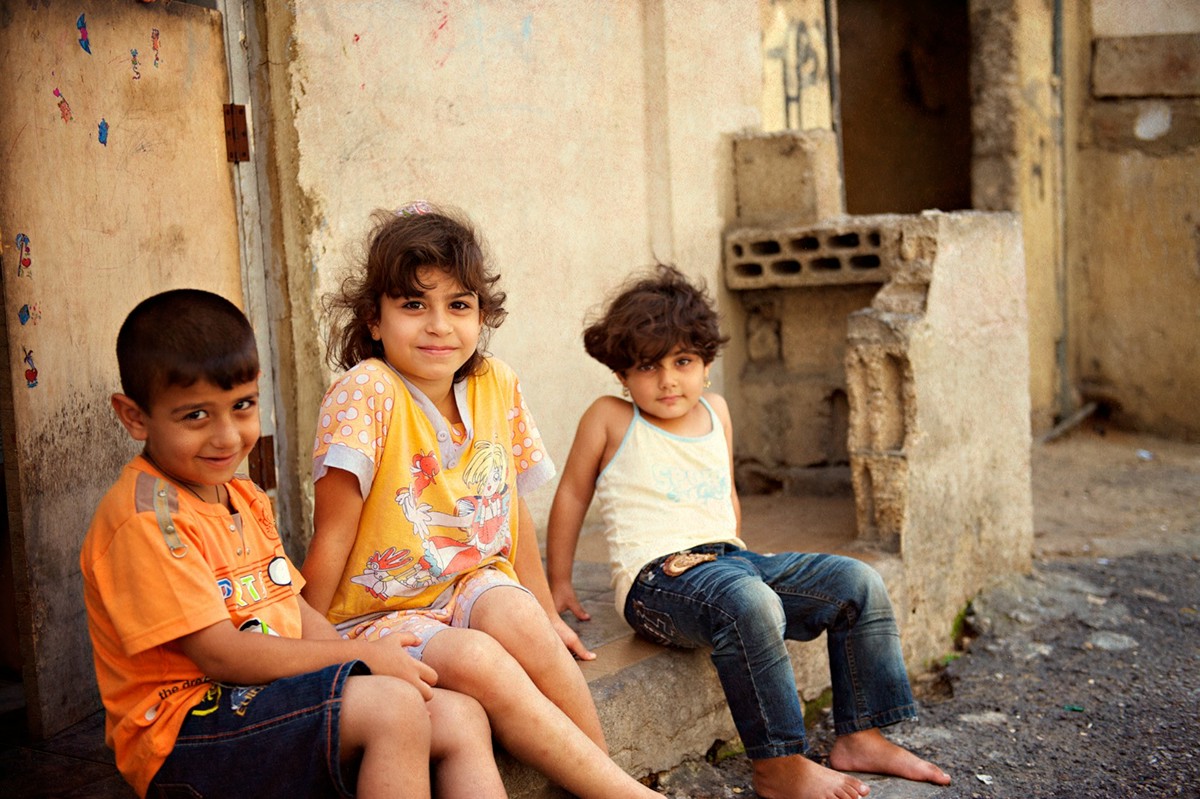
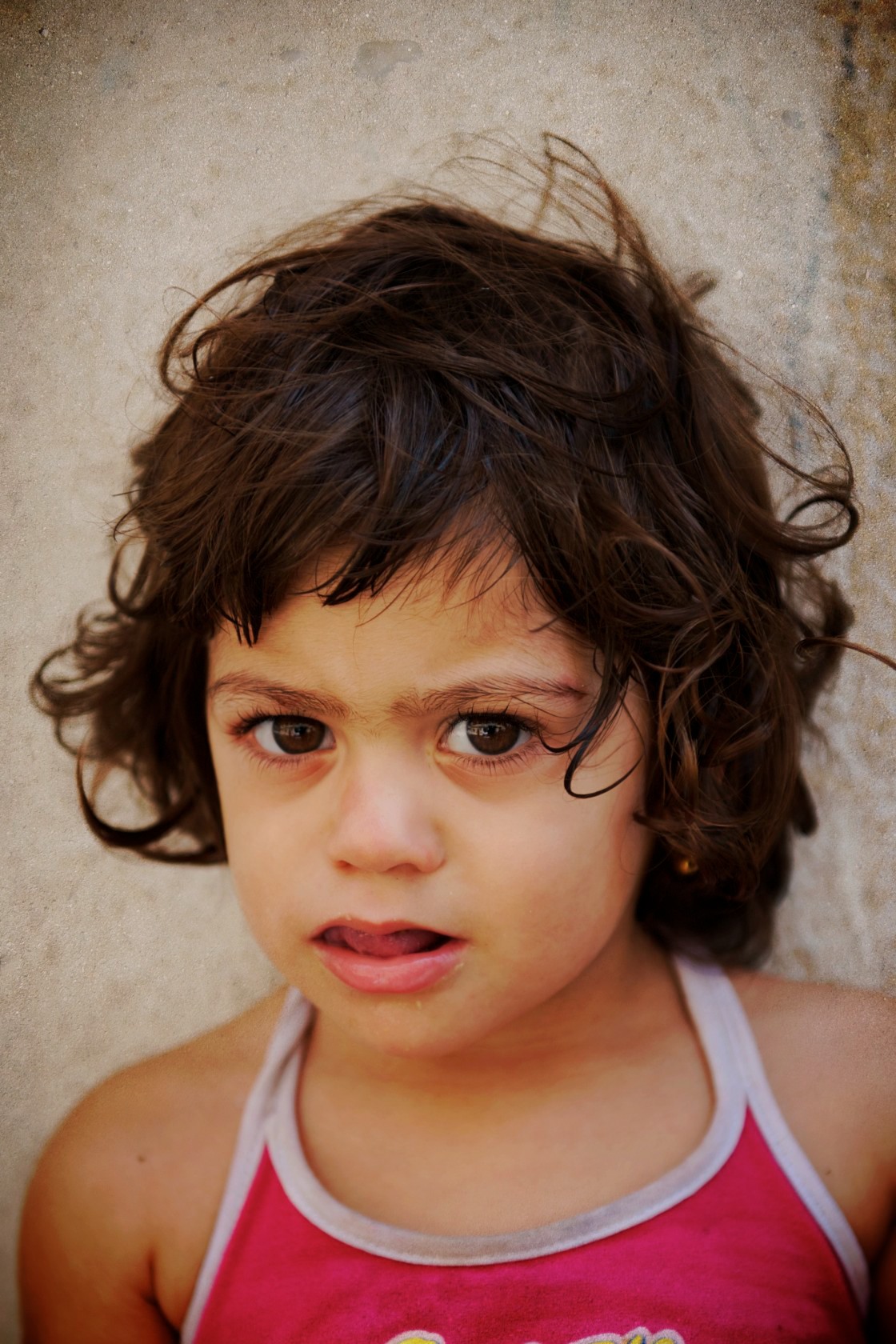
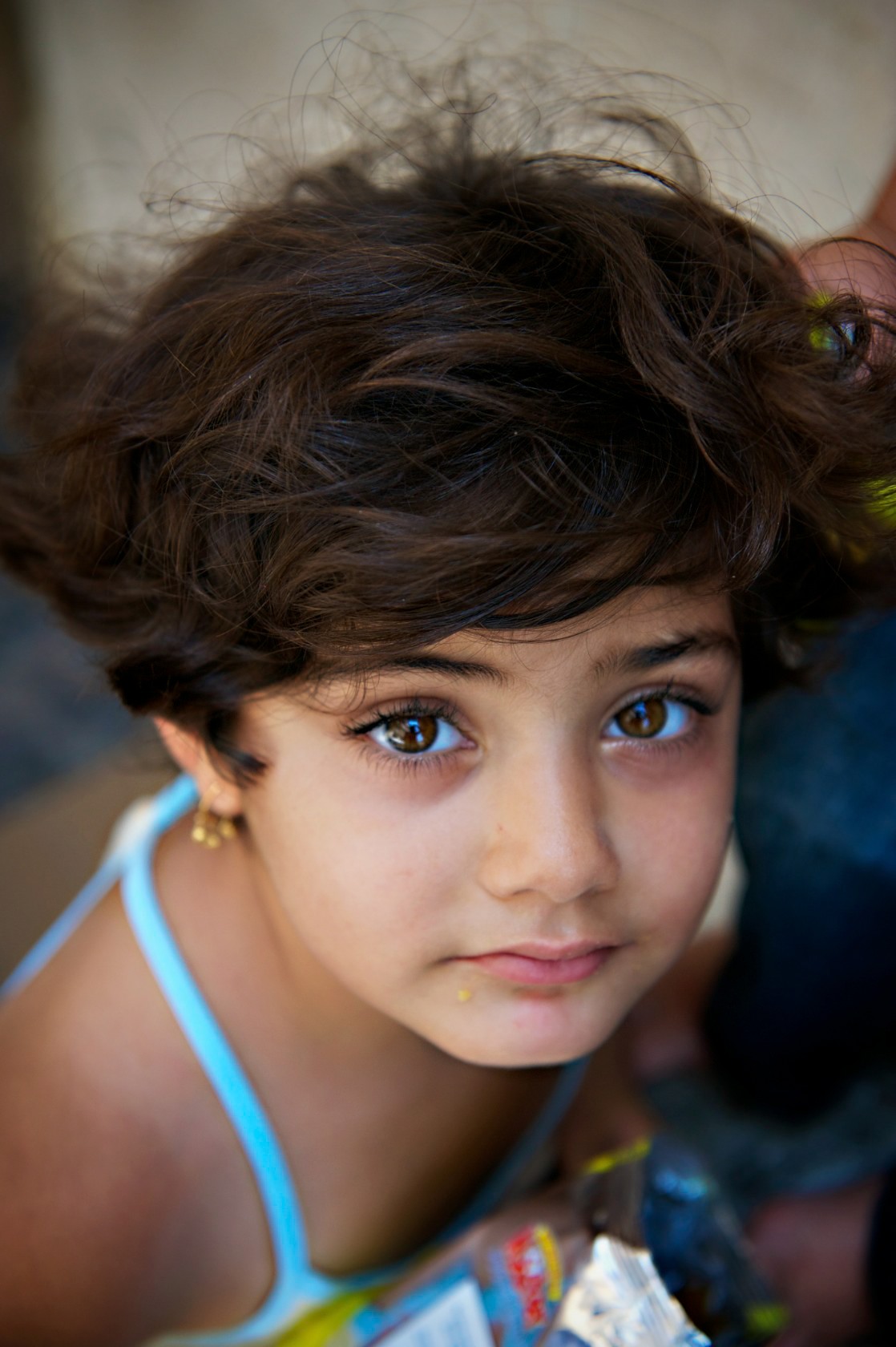
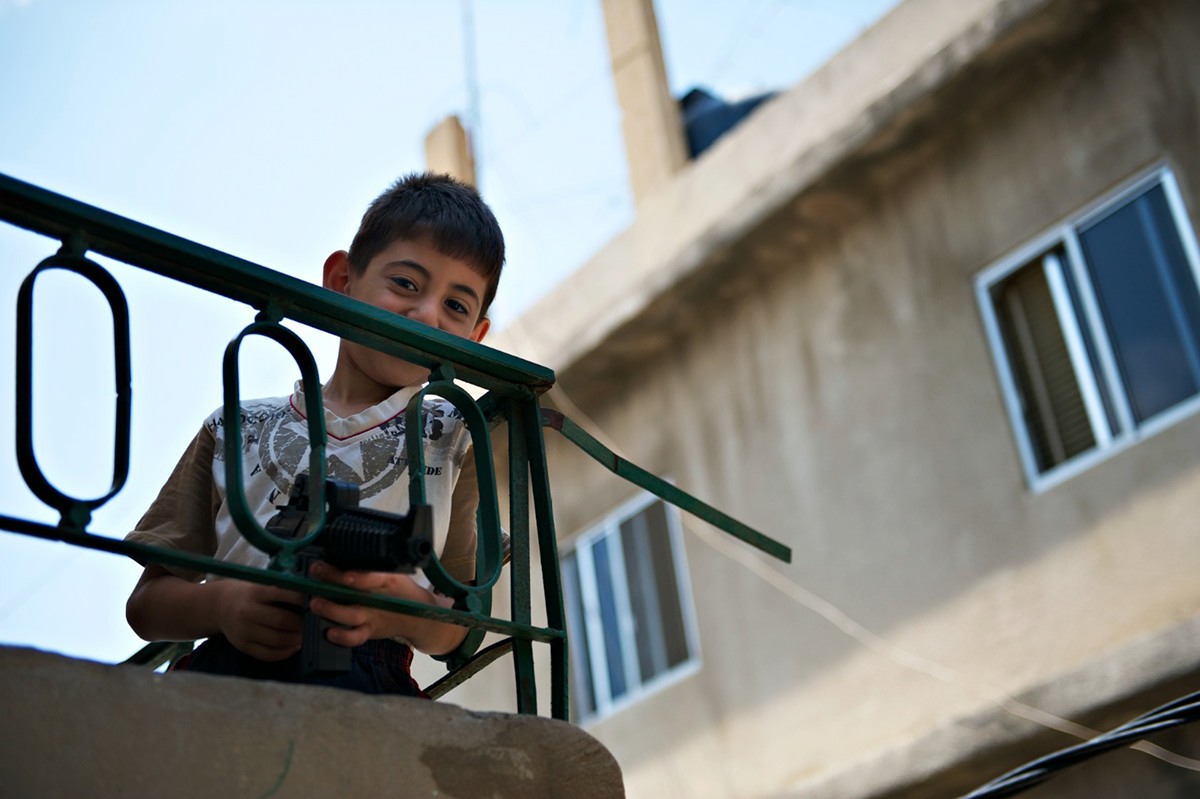

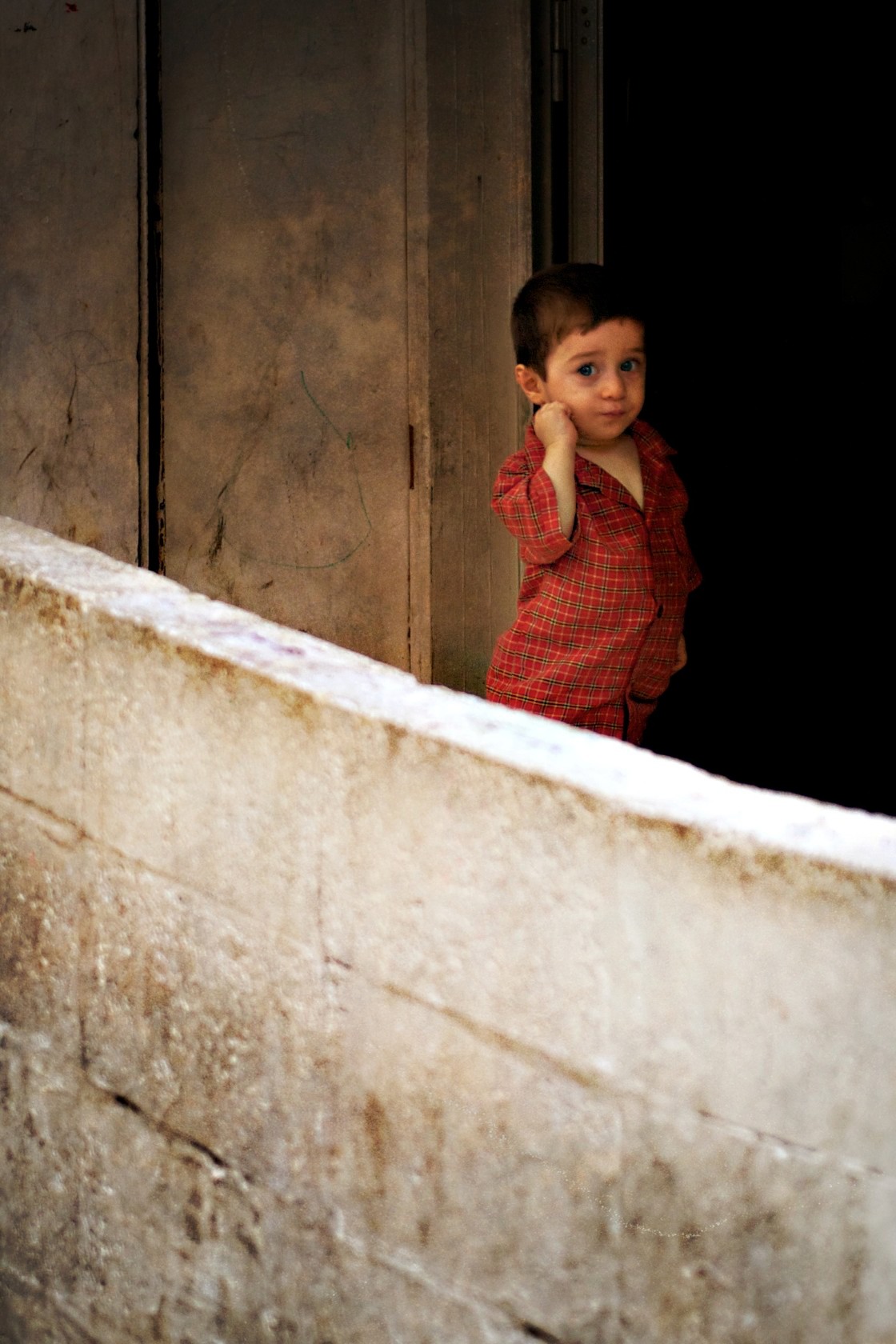
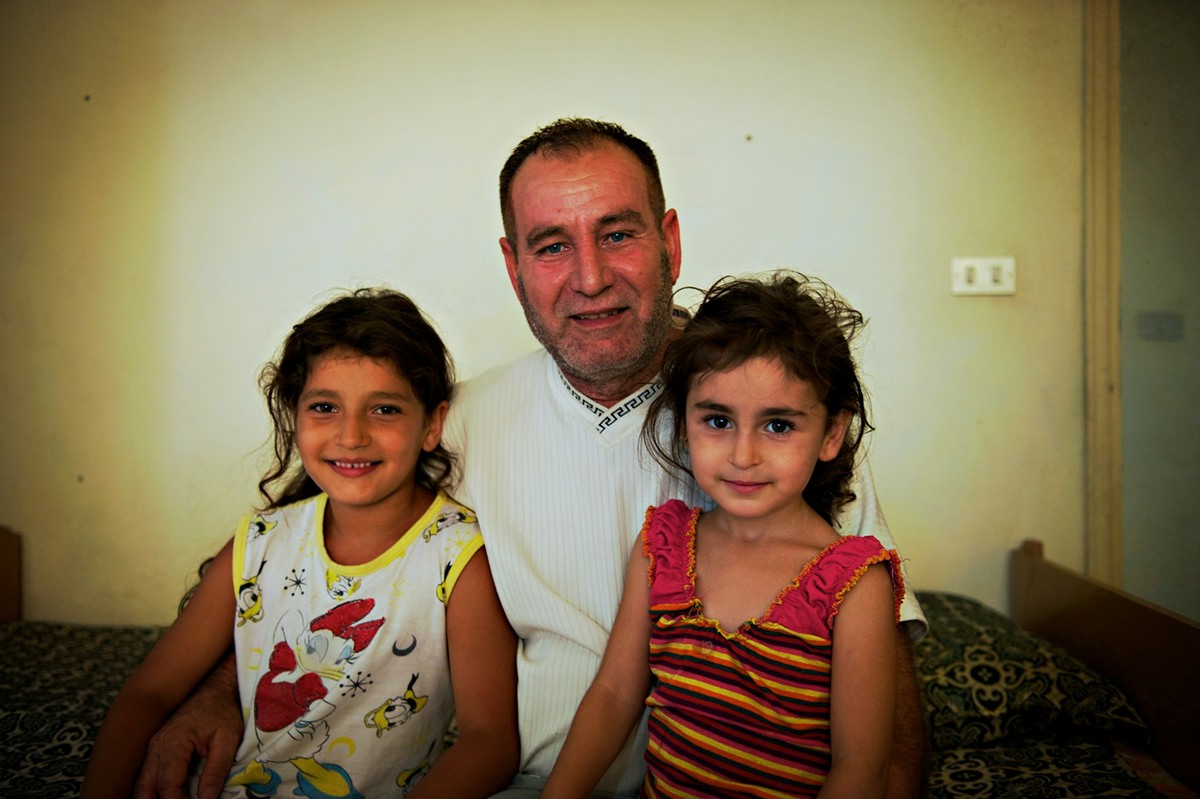
Daud and his two daughters
A Different Kind of Heros
There are times, seldom but eternally remembered, when I meet someone for the first time and, for some inexplicable reason, my heart immediately warms up towards them and I let down my defenses a bit quicker than I typically do. In hindsight, I am quick to see that first acquaintance as God-ordained, but there and then I am merely intrigued by that persons face, mannerisms, look, voice, and interaction with me or with those around us.
Amir is one of those people. When we were greeted by him and his family outside their one-room apartment in the suburbs of Beirut, his face immediately struck me. It carried a tender look, a face adorned by the brightest blue eyes, creased by the weight of life yet smiling for Amir knew that visits paid by his Lebanese friends were a nice break in a life full of routine and isolation. Squeezing into their poorly ventilated apartment, Amir helped us get as comfortable as we possibly could and then, as is customary, offered us some Arabic coffee. He was eager to talk about life. For my sake, he talked of life in Iraq, of how things changed with the US invasion when as a Christian he was no longer able to freely worship as he had before. Reluctant to bow down to fear, his family still attended mass every now and then, and when Easter came around they were thrilled to make it. Sadly, that night was to be their last night at church. Returning home before sunset, what awaited them was an ugly scene. Their house had been broken in once again, their belongings stolen or destroyed, but this time words of hatred had been painted over their walls, calling them traitors, double-agents, and threatening to kill them all if they stayed. In Amirs words, he did not want to give the perpetrators the pleasure of killing them. He has seen the same happen to his neighbors and knew that their message was not empty. And so they packed their bags and left Iraq. Curious as I was, I asked Amir if he though he would ever return to Iraq, but my curiosity seemed badly-timed as Amir stood up, grabbed a towel and walked out, allowing me a fleeting look of his crying face as he did so. I learned that Amir had to leave his father on his deathbed to protect his family. It was hard for him to walk away, knowing that he would never see him again. Amir eventually came back, sat down and, fiddling with a rubber band, listened as one of his Lebanese friends shared what she had gone through during Lebanons war in 1982. His demeanor was different now. No longer sitting straight, no longer making eye contact. Amir respectfully let her finish before he asked if was allowed to ask one question, Why did America do this to us? His question begged a response, yet I believe none could be ever given that would satisfy his heart, a heart that visibly struggles with the injustices done to him, his family, his people, his nation.
Similar to Amir in many ways was Daud, pictured above with his two beautiful daughters. Yet Daud travelled a different journey to Lebanon than Amir. Daud was kidnapped and ransomed for three times. His two younger brothers were killed right before Christmas. In Lebanon, he is often immobilized by fear, thinking up the worst when coming across clusters of men. He is unable to find work, physically incapable to do the jobs most Iraqis do with a back maimed by the multiple beatings that kept him under control while kidnapped. And so Daud has had to do what is perhaps the hardest for any Iraqi man to do, and pass the breadwinner role to his wife and four young sons. His heart struggles, like Amirs, caught between too many enemies, too much evil, too little comfort. Yet, in the midst of great turmoil, I believe Dauds heart is being touched by Love, for there is simply no other way to explain the otherwise foolish behavior of giving to others when living in so much lack. For it is truly reflective of a compassionate and loving heart the act of freely choosing to give his familys monthly food ration to Iraqi neighbors when he has been stripped of so much.
One more trait that Amir and Daud shared was their heroic spirit. Manhood ought no longer be entered in with images of ludicrously built, heavily armed, narcissistic men, displayed on little boys personal computers and families TV screens as the lords of our time. Rather, it should be built on the lives of men who have looked evil in the eyes but are still operating in love; a selfless love that drives them to give up all they had ever lived for to provide their children with a future. For it takes the spirit of a hero to endure war for seven years, refusing to leave their nation until their family is threatened with death, leaving them with no choice but to protect their loved ones at any cost. These are men stripped of their identity the minute they part from Iraq, becoming one of many refugees, aliens, Arabs, Muslims whom we have kindly provided with asylum, given first that they swear to always protect the nation receiving them. Indeed, men like Amir and Daud are heroes, and it is their stories that little boys need to hear when put to bed.
There are times, seldom but eternally remembered, when I meet someone for the first time and, for some inexplicable reason, my heart immediately warms up towards them and I let down my defenses a bit quicker than I typically do. In hindsight, I am quick to see that first acquaintance as God-ordained, but there and then I am merely intrigued by that persons face, mannerisms, look, voice, and interaction with me or with those around us.
Amir is one of those people. When we were greeted by him and his family outside their one-room apartment in the suburbs of Beirut, his face immediately struck me. It carried a tender look, a face adorned by the brightest blue eyes, creased by the weight of life yet smiling for Amir knew that visits paid by his Lebanese friends were a nice break in a life full of routine and isolation. Squeezing into their poorly ventilated apartment, Amir helped us get as comfortable as we possibly could and then, as is customary, offered us some Arabic coffee. He was eager to talk about life. For my sake, he talked of life in Iraq, of how things changed with the US invasion when as a Christian he was no longer able to freely worship as he had before. Reluctant to bow down to fear, his family still attended mass every now and then, and when Easter came around they were thrilled to make it. Sadly, that night was to be their last night at church. Returning home before sunset, what awaited them was an ugly scene. Their house had been broken in once again, their belongings stolen or destroyed, but this time words of hatred had been painted over their walls, calling them traitors, double-agents, and threatening to kill them all if they stayed. In Amirs words, he did not want to give the perpetrators the pleasure of killing them. He has seen the same happen to his neighbors and knew that their message was not empty. And so they packed their bags and left Iraq. Curious as I was, I asked Amir if he though he would ever return to Iraq, but my curiosity seemed badly-timed as Amir stood up, grabbed a towel and walked out, allowing me a fleeting look of his crying face as he did so. I learned that Amir had to leave his father on his deathbed to protect his family. It was hard for him to walk away, knowing that he would never see him again. Amir eventually came back, sat down and, fiddling with a rubber band, listened as one of his Lebanese friends shared what she had gone through during Lebanons war in 1982. His demeanor was different now. No longer sitting straight, no longer making eye contact. Amir respectfully let her finish before he asked if was allowed to ask one question, Why did America do this to us? His question begged a response, yet I believe none could be ever given that would satisfy his heart, a heart that visibly struggles with the injustices done to him, his family, his people, his nation.
Similar to Amir in many ways was Daud, pictured above with his two beautiful daughters. Yet Daud travelled a different journey to Lebanon than Amir. Daud was kidnapped and ransomed for three times. His two younger brothers were killed right before Christmas. In Lebanon, he is often immobilized by fear, thinking up the worst when coming across clusters of men. He is unable to find work, physically incapable to do the jobs most Iraqis do with a back maimed by the multiple beatings that kept him under control while kidnapped. And so Daud has had to do what is perhaps the hardest for any Iraqi man to do, and pass the breadwinner role to his wife and four young sons. His heart struggles, like Amirs, caught between too many enemies, too much evil, too little comfort. Yet, in the midst of great turmoil, I believe Dauds heart is being touched by Love, for there is simply no other way to explain the otherwise foolish behavior of giving to others when living in so much lack. For it is truly reflective of a compassionate and loving heart the act of freely choosing to give his familys monthly food ration to Iraqi neighbors when he has been stripped of so much.
One more trait that Amir and Daud shared was their heroic spirit. Manhood ought no longer be entered in with images of ludicrously built, heavily armed, narcissistic men, displayed on little boys personal computers and families TV screens as the lords of our time. Rather, it should be built on the lives of men who have looked evil in the eyes but are still operating in love; a selfless love that drives them to give up all they had ever lived for to provide their children with a future. For it takes the spirit of a hero to endure war for seven years, refusing to leave their nation until their family is threatened with death, leaving them with no choice but to protect their loved ones at any cost. These are men stripped of their identity the minute they part from Iraq, becoming one of many refugees, aliens, Arabs, Muslims whom we have kindly provided with asylum, given first that they swear to always protect the nation receiving them. Indeed, men like Amir and Daud are heroes, and it is their stories that little boys need to hear when put to bed.
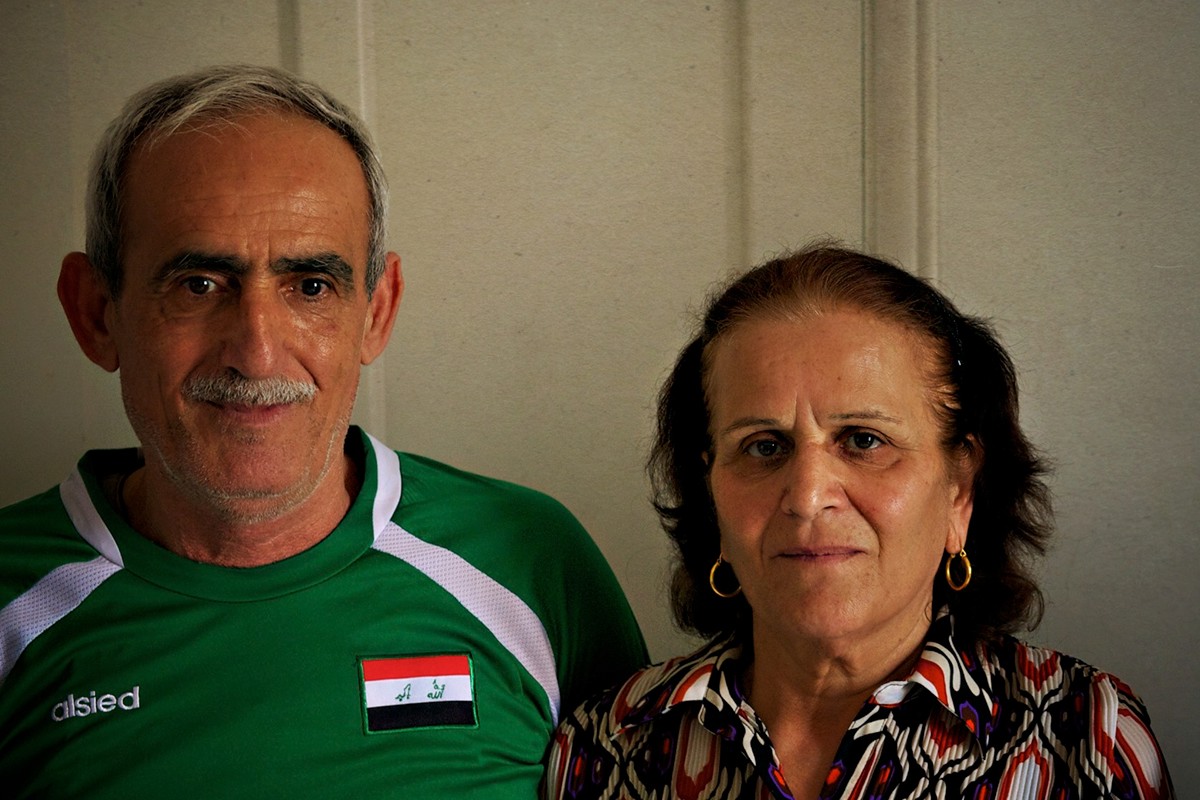
Ghanim and his wife Nagiba: Ghanim shared that it hurts to think how the war has dispersed his family in so many different lands. He wondered if they would ever find themselves in the same place again.

Remon and his wife Nawal: Left Iraq after their shop was blown up. Life in Lebanon has been rough as they continue to wait to be granted asylum in Australia.

Hani, as he talked of how two of his children had been separated from the family and granted asylum in Canada. Hani, his wife, and their four remaining children will resettle in El Cajon, San Diego, but they will be unable to see the rest of their family until they are granted the Green Card, which would allow them to travel.
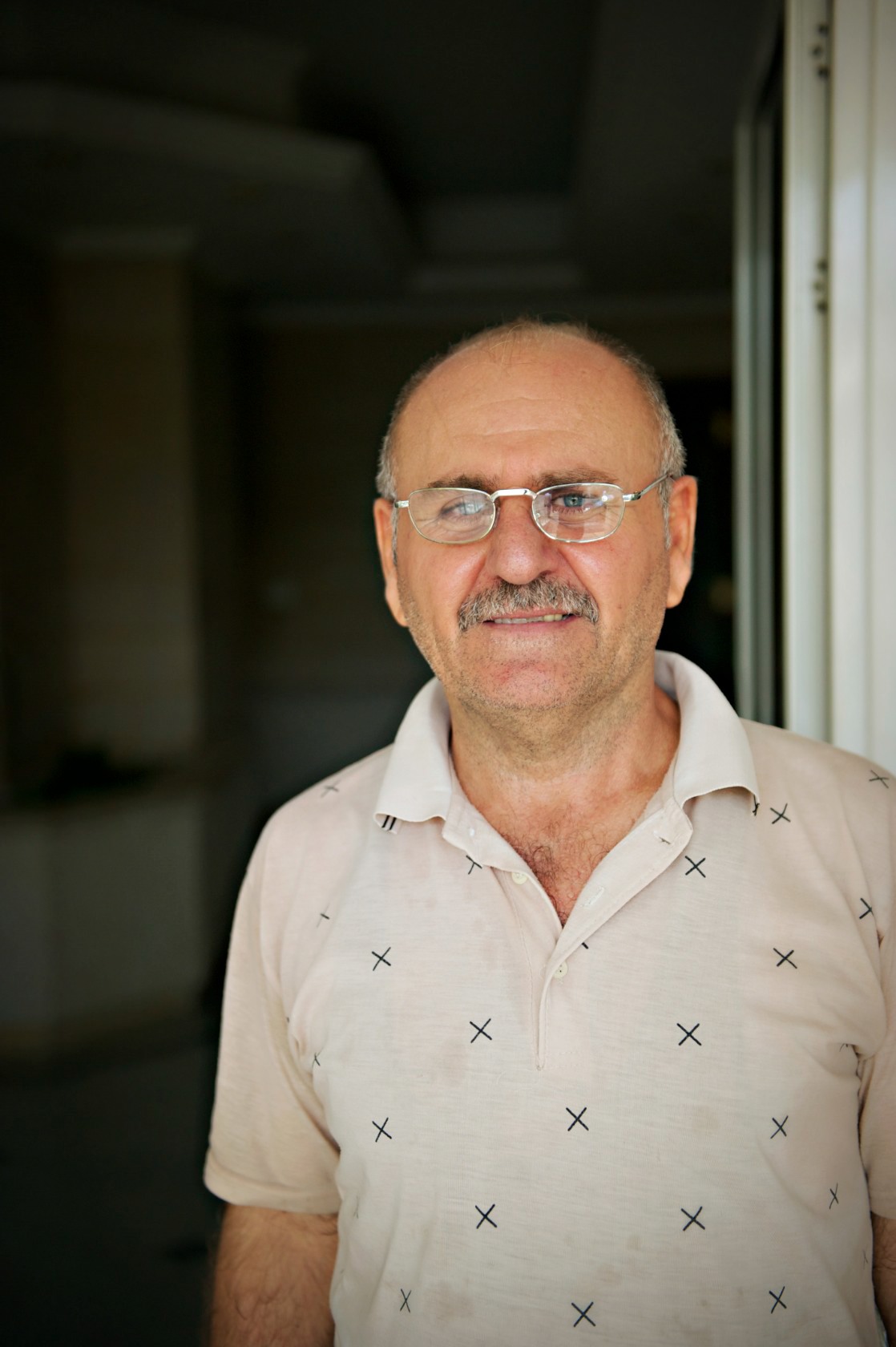
Thaqer lost one brother to the 2003 war. One of his sons was kidnapped but released when his family promised to leave Iraq. Many Christian Iraqis shared how they have been targeted by both Sunnis and Shiites, getting the worse of both ends. The aim of the latter is to drive all Christians out of the country, as they are considered to be American allies.

Adenan, Nasima, and children Valentina and Divan: Adenan’s brother was kidnapped six years ago and they never heard news of him. Adenan shared how his faith has faltered as he struggles with what has happened to his family and the unknown that lies ahead.

I dont know about you, but I got away with a lot during my teenage years. Reckless adventure, a deep passion to experience novel things and emotions, the drive to create and to be different, and a good dosage of foolishness made for a good start in transitioning from childhood into adulthood. And I am grateful that no one tried to fast forward that transition. During those years I had some around me whose adolescence was speckled with dark things, but none were quite as different as the youth I was exposed to this summer: Iraqi teenagers, no longer children, not quite adults, juggling childlike dreams and adult responsibility, torn between the desire to stay young and irresponsible and the fierce determination to be an adult and provide for their families.
In my opinion, the Iraqi teenagers temporarily settled in Lebanon have it the hardest. They live in a limbo within a limbo. They are suspended somewhere between childhood and adulthood, unable to grow up so quickly yet aware that childhood no longer bears their identity. In addition, they are caught between what was and what is yet to come as bureaucratic organizations process their asylum application in what is often a long-drawn-out manner. With the invasion, and the violence and uprising that followed, to graduate from high school into college became a luxury in Iraq. As family businesses were targeted, jobs lost, and life became more expensive, families could no longer support further education, especially their sons. Besides, attending school was becoming dangerous as school buses were being blown up and children kidnapped outside schools. And so many teenage sons had to pick up jobs, usually with the American army, the one sustainable entity in Iraq throughout the war. Girls, on the other hand, were safer at home.
With the move to Lebanon, the grass did not get any greener. With little savings, if any, higher rent, and a higher cost of living, Iraqi families could not afford to have their teenagers at home. This time, however, the context is even more complex. Iraqi refugees enter Lebanon legally. They fly in, get a month-long visa, and are allowed to enter the country without any questions. The Lebanese authorities know that arriving Iraqis are not tourists, but they let them in nonetheless, ever so aware of the consequences. Upon arrival the Iraqis register as refugees with the United Nations High Commissioner for Refugees, only to become officially illegal a month later. Lebanon is not a signatory of the Refugee Convention and so authorities have little regard to Iraqis refugee status.
What makes the context complex is that although their presence is not concealed, no one seeks them out, allowing for the Iraqis to gain a sense of false freedom. Iraqis know that any work they do is illegal and strictly seen as so with harsh repercussions, but as many get away they believe that they can too. Ironically, Lebanons economy is booming and so Iraqis look for work, find it, and take it. Lacking any and all rights, their wages are pitiful and days worked are long and hard. Teenagers are in demand, their strength favored over that of adults. Most of the families I met are being sustained by their teenagers, not only sons but also daughters. And so they take the risk and choose to take up work to sustain their families. Then one faithful day they come across a street patrol, are asked for their documents, are unable to provide them, and are arrested and imprisoned, indefinitely unless they are willing to be deported back to Iraq.
I met a father whose two teenage sons, 14 and 17 years old, had been imprisoned. When he opened his empty fridge to offer us some cold tap water, I knew that it was out of need that his sons had looked for work. As he talked of how hard it has been for them to be locked up amongst criminals, my translator whispered that many amongst them are abused, often frail and alienated in dark, filthy, and overcrowded cells. This was sadly confirmed by Hani, a young Iraqi who had been imprisoned for five months until he agreed to be deported. Soon after his deportation, Hani returned to Lebanon and when we visited with him he was willing to share about time spent in Lebanons largest prison. He talked of his cell being so dark that he could never tell whether it was day or night. He said that he was brought out into the sunlight once a week for an hour and before he knew it he spiraled into depression and started to harm himself just to feel something. Hani still suffers from breathing problems and other health issues, which he blames on the filthy food and water that was served in prison. He shared how he is now terrified of being caught again but has no choice but to leave for work every single morning.
Having had many conversations with other Iraqi youth, some resettled in El Cajon, San Diego, and others in Lebanon, I know the dreams they have to start life anew. Their life was hijacked at its best by a war that tore their innocence apart and demanded that they grow up, fast. Yet, they dream big, unwavering as they face many challenges, adjustments, and unknowns. Their hopeful determination is what drives them to bravely face the risk of imprisonment, believing that their courage will win the day. Their teenage spirit is not easily consumed by fear but I do wonder whether it is valiant enough to stand against the evil that roams the prison cells. I know mine would have been gravely bullied by it, but perhaps youd stand to differ.
The following pictures were taken in Zaaytrieh and Sed el Bouchrieh, two neighborhoods in the suburbs of Beirut that host many Iraqi refugees.
